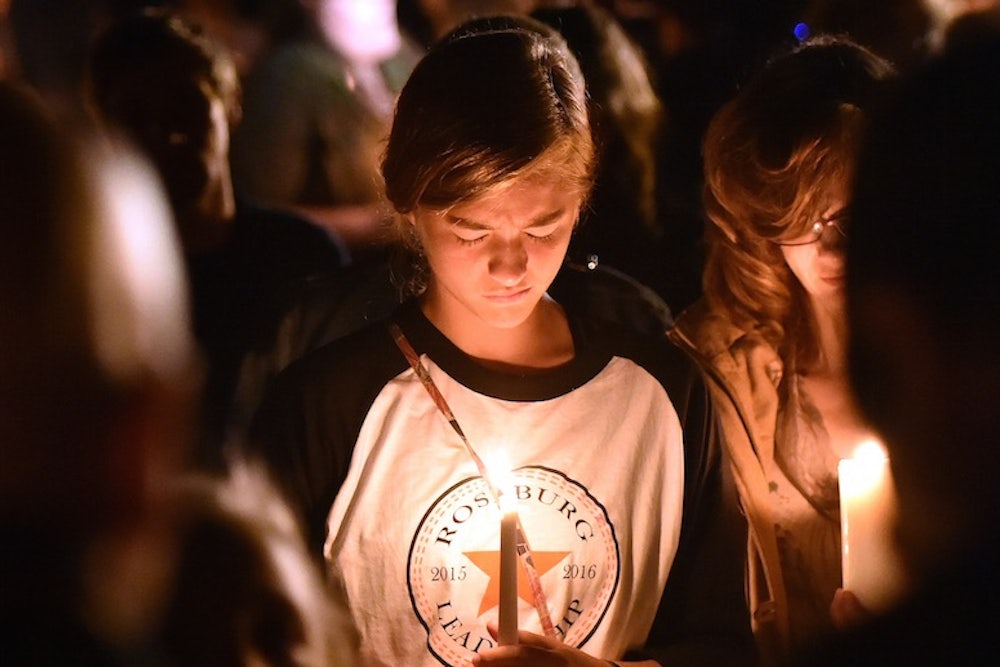Depending on where you get your news, Thursday’s shooting at Umpqua Community College in Roseburg, Oregon, was the 294th mass shooting, the 295th, or the 45th school shooting of the year. As Dave Cullen wrote in New Republic, news outlets will get the facts wrong in the immediate aftermath of an attack, but the conflicting news reports point to a more serious problem in America’s discussion of its gun problem. Gun control advocates rely heavily on the shocking numbers to make their case, but statistical discrepancies allow opponents to easily undermine the arguments. There’s no case to be made when everyone gets to view the evidence on their own terms.
The confusion stems from varying governmental categorizations. There are mass murders and mass killings, active shooters and serial killers, mass shootings and mass public shootings. For instance, Mass Shooting Tracker, a crowd-sourced website that many news outlets use, defines a mass shooting as one with “four or more people shot in one event.” In other words, they include incidents in which four people are wounded, but no one is killed. Accordingly, the database considers the Umpqua shooting the 295th mass shooting of the year.
The FBI, by contrast, doesn’t have an official definition of “mass shooting” on the books, but in 2014 defined a “mass killing” as one with three or more fatalities in a report about active shooters—“an individual actively engaged in killing or attempting to kill people in a confined and populated area,” like at Columbine or Newtown. Using the three-fatality threshold, the Oregon shooting is the 54th mass killing of 2015. But in July, the Congressional Research Service (CRS) defined a mass shooting as a homicide in which four or more people are killed with firearms—a definition based on the FBI’s definition of a “mass murder” as opposed to a “mass shooting.” Under that definition, the Oregon shooting is the 32nd such incident in 2015.
The conflation of “active shooter,” “mass murder,” and “mass shooting” has allowed the gun lobby to discredit statistics that point to the need for further control. The 2014 FBI report showed that active shooting incidents were increasing, but the NRA and other groups complained that this did not necessarily mean mass shootings were also increasing. Opponents of gun control can claim, like Jeb Bush did on Friday, that “stuff happens,” implying such incidents are just a fact of modern life.
Similarly, Northeastern University criminologist James Alan Fox has said that the inclusion of statistics from the FBI’s “active shooter” report gives the false impression that incidents are rising when they are not. “A majority of active shooters are not mass shooters,” Fox told Time. “A majority kill fewer than three.” On Friday, Fox wrote in USA Today that “media folks reminded us of the unforgettable, high profile shootings that have taken place over the past few months, hinting of a problem that has grown out of control… as if there is a pattern emerging.”
Fox is correct in pointing out that “active shooters” and “mass shootings” are not the same thing. But other statistics, including a Harvard analysis, show that mass shootings—in which four people were killed—have increased in frequency. The July CRS report also indicated that mass shooting incidents are also becoming deadlier.
Of course, no matter which definition—and which statistics—you choose, America’s gun violence is appalling. The difference between three dead and four dead might be statistically significant, but is morally negligible. Just hours after the Oregon shooting, a man shot dead his wife and two others, and injured a fourth person, in North Florida. On Friday, five people were shot outside a Baltimore shopping center. The Mass Shooting Tracker total is now at 297.
